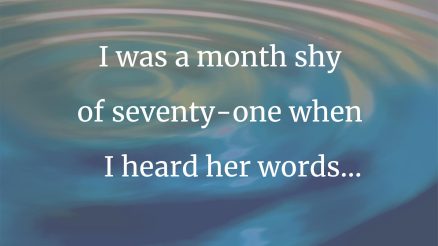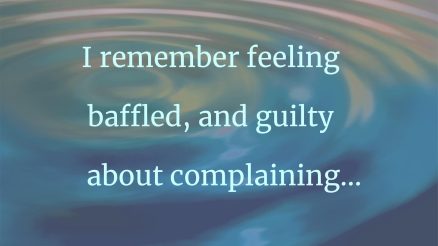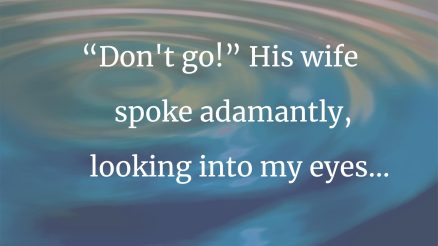- Home
- /
- Stories
Stories

Under the Microscope
I was walking into my kitchen with an armful of groceries when my cell phone rang. It took a second to register the caller’s name: Dr. James. The surgeon I’d met two weeks earlier.
I wasn’t expecting this call. My biopsy had occurred only a few days ago, and I’d been told that, because of the Christmas holiday, the results would be delayed.
Why is she calling?

None of My Mom Friends Are Dying
Editor’s Note: This piece was awarded an honorable mention in the Pulse writing contest, “On Being Different.”
I’m squarely in the middle of my friends, in terms of when we became “mom friends.” However, one aspect sets me apart: None of my mom friends are dying.
None had excruciating pain during pregnancy, unrelenting constipation or unexplained blood in their stool. None went septic five days postpartum or were ultimately diagnosed with stage IV colon cancer with liver, lung and peritoneal metastases. None are parenting a two-year-old, knowing that they might not see him turn three.

Total Immersion
Winter 1979
After my first ever transatlantic flight, my plane touches down at Kingston Airport, Jamaica. As we taxi towards the gate, I think back on the events leading up to this moment.
Earlier this year, I’d resolved to leave my native Scotland. Two years out of medical school, having done my internship and three stints as a locum in several specialties, I still had no idea for my future. I wrote to hospitals from Singapore to Mauritius to the island of St. Helena, asking about openings for a junior doctor. Medicine was my ticket into the world, to adventure, to finding my path in life.
“ACCEPTED FOR JOB STOP START IMMEDIATELY STOP,” said the telegram from the University of West Indies Hospital in Jamaica.

The Nightstand
Editor’s Note: This piece was a finalist in the Pulse writing contest, “On Being Different.”
Poverty has many ways of marking a child.
Growing up in the 1950s and early 1960s in a Southern cotton-mill town, I was the fourth of six children of a single mother who did the best that she could; but her job as a hemmer of washcloths in Plant #1 paid little, and six children had many necessities that shut the door on nonessentials.
Growing up in the textile town, I was reminded of my poverty by what I could not have.

My Doctor Joe
Winter 1961
I recall Dr. Ulrich making a house call that night to our residential shoebox on Longview Avenue in Akron, Ohio. My parents were renting the pint-size place. My mother loathed visiting cemeteries and talking about death, so I suspect she felt edgy living across the street from the roomy Sherbondy Hill Cemetery.
That freezing night in 1961, I lay in my parents’ bed, a big bed that swallowed up my little-boy body. I wanted to fall asleep, but I was too restless.

A Duplexity of Maladies
Editor’s Note: This piece was a finalist in the Pulse writing contest, “On Being Different.”
I have a body besieged by two chronic illnesses, namely multiple sclerosis (MS) and bipolar disorder. My health profile has been described as “abnormal,” but I’ve always resisted that term in favor of “atypical,” for my poor health renders me unusual but not inhuman.
Still, the truth is that I am essentially and profoundly sick. My imbalanced body frequently aches, hurts and falls, my labile mind races or crawls. While medications can ameliorate my symptoms, they cannot cure my illnesses.
My body betrayed me when I was on the cusp of adulthood.

No One Left to Save
“Do you want to call time of death?”
I stared up at my resident Hassan, shocked by his question. My stethoscope was still pressed to the elderly patient’s emaciated chest. Her agonal breaths, those last shallow breaths the body takes before death, had ceased. Only silence filled my ears.
Hassan smiled at me. I knew that he was offering this to me as a reward for all my hard work, but still, I was stunned.

Chameleon
Editor’s Note: This piece was awarded an honorable mention in the Pulse writing contest, “On Being Different.”
On my first day of kindergarten, in Little Rock, Arkansas, I discovered that I was different. All of my classmates had experienced their first day of school together in August, but I didn’t turn five until after Labor Day, so my first day of school, in September, came coupled with being the new girl in class.
Also, for the first time in my life, someone asked me a question that would follow me, in various forms, for the rest of my life:
“Are you Black or white?”

The VIP
It was late at night, and as the neurosurgery resident on call, I was alone in the hospital, wishing that I could lie down, or even just slow down, in the midst of a busy shift.
I sat for a moment, awaiting the inevitable next phone call or text. Predictably, my phone rang within minutes. It was the trauma-team resident.
